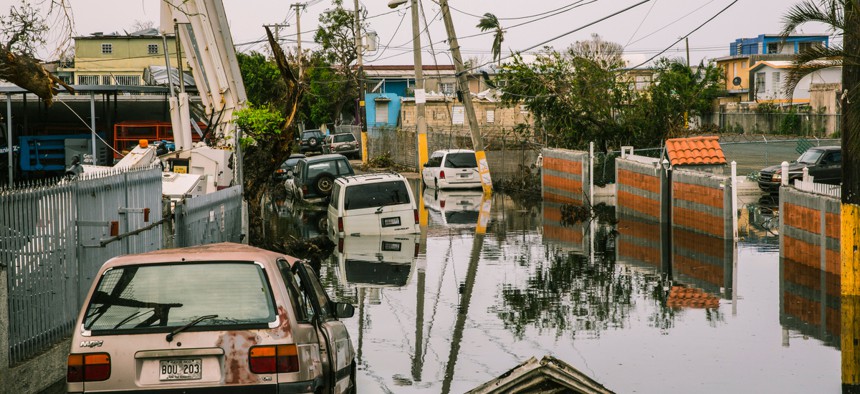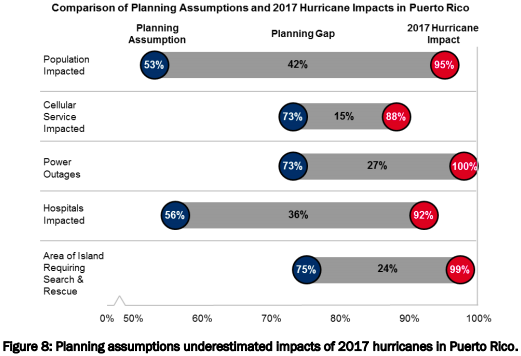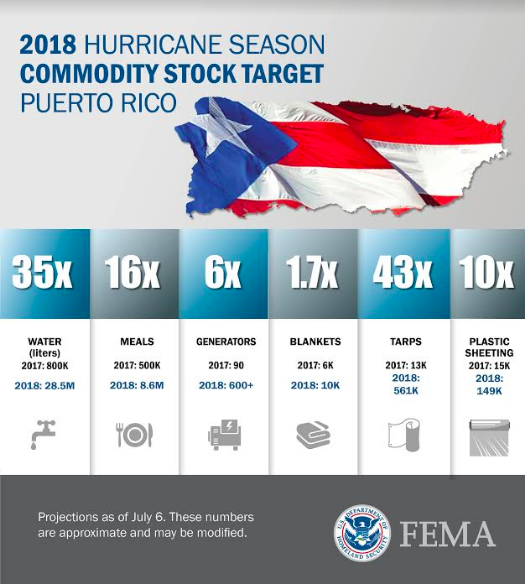FEMA Acknowledges Shortcomings In Puerto Rico Hurricane Response

Streets in the Ocean Park sector of San Juan remain flooded weeks after Hurricane María utterly devastated the entire island of Puerto Rico in 2017. Shutterstock

Connecting state and local government leaders
A new report also suggests that states and territories should shoulder more of the burden after disasters.
Staffing shortages at the Federal Emergency Management Agency during the 2017 hurricane season and other logistical shortcomings hampered the response after Hurricane Maria walloped Puerto Rico, the agency says in a new report.
The after-action report, released Thursday, reveals the agency also dealt with contracting personnel strains across disasters in 2017, had trouble tracking billions of dollars in meal and water supplies, and remains behind targets for disaster workforce certifications.
Hurricane Maria’s devastation of Puerto Rico and the U.S. Virgin Islands proved particularly trying, with FEMA failing to utilize previous training exercises that suggested that Puerto Rico would need intensive federal help.
One official who works with state government leaders said, in the case of Puerto Rico, lack of electricity and communications were the biggest disaster response struggles.
“For governors the focus is always power, health, food, water, and shelter,” Jeff McLeod, director of the National Governors Association’s homeland security division, told Route Fifty. “So any time those things fall through or aren’t addressed, that’s a huge issue.”
FEMA notes that key supplies in Puerto Rico, such as cots and tarps, were moved weeks before the storm to St. Thomas to help with recovery there from Hurricane Irma. That meant when Maria struck Puerto Rico, there was an "immediate deficit of commodities" there, requiring supplies to be airlifted in.
The Caribbean Distribution Center warehouse in Puerto Rico had no cots or tarps left and only 180 units of blue roof sheeting, 1 percent of total inventory, when Maria hit, the report says. That’s a scenario where contingencies become important, McLeod said.
Much of the problem was that FEMA underestimated needs ahead of the 2017 hurricane season and was forced to rely on crisis action planning to cover shortfalls.
Power outages were estimated to affect 73 percent of the island should a hurricane, earthquake or tsunami strike, when in reality 100 percent of the territory was affected—a 27 percent planning gap.

The report concludes that 2017’s three hurricanes, coupled with wildfires in California, required “major adaptations” to FEMA operations that remain a work in progress one month into the 2018 season.
“Not surprisingly, the unprecedented scale and rapid succession of these disasters stretched response and recovery capabilities at all levels of government, and it is transforming the way emergency managers prepare for and respond to disasters,” FEMA Administrator Brock Long wrote in a letter introducing the report. “The challenges we faced required that we innovate and deliver our programs differently.”
More disaster survivors registered for FEMA assistance in the aftermath of Hurricanes Harvey, Irma and Maria and the California wildfires than in the previous 10 years combined.
In Puerto Rico, Maria rendered 95 percent of cell towers inoperable, which has FEMA currently refining land mobile radio to satellite communications.
“As a result local, territorial, and federal agencies faced difficulties knowing what was needed and where in the immediate aftermath of the storm,” Long wrote.
Internet access may even be more critical than cellular communications moving forward because of people’s reliance on mobile applications, McLeod said.
FEMA found itself coordinating entire community logistics in Puerto Rico and facilitating meal and water transport from staging areas to survivors, which “should largely be managed and coordinated at the state or territory level,” according to the report.
McLeod agreed FEMA is there to support states and territories, which are in turn responsible for distributing resources on the ground.
The agency’s 2018-2022 Strategic Plan that Long implemented emphasizes the need to increase state capacity and improve intergovernmental coordination to take some of the burden off of the federal government.
“I know he’s trying this model out in North Carolina,” McLeod said. “We just want robust engagement with states during a disaster and to ensure this isn’t the start of the federal government leaving it to states to fend for themselves.”
FEMA already consolidated facilities to increase capacity last hurricane season, and is now calling for revisions to the National Response Framework and Response Federal Interagency Operational Plan that will hopefully quicken stabilization of lifelines like power, communications, commodities and transportation in future disasters.
The agency also proposes establishing a public-private Interagency Power Task Force that can turn into a crisis action planning cell during disasters.
Staffing improvements are being made at the Personnel Mobilization Center, a central location for equipping and training workers prior to disaster deployment, the report says
And this hurricane season has seen commodities kept at locations in the Caribbean increased more than sixfold—enough to support 600,000 survivors for three days—and about 300 new emergency generators added to FEMA’s inventory in advance of crises. There are now five commodity storage warehouses on Puerto Rico, instead of one.

“While FEMA has increased its commodity stock in Puerto Rico, we’re urging households to gather 10 days of essential supplies,” FEMA said in an email to Route Fifty. “For Puerto Rico to be ready for the next disaster, preparedness must be implemented on all levels—from individual households to municipalities to the Government of Puerto Rico and the federal government.”
Housing was a final FEMA shortfall during the 2017 hurricane season that the agency is working to address by lessening the inspection burden for survivors.
“FEMA challenges its federal partners to think beyond current policy, regulatory, and legislative restrictions to determine how best to deliver post-disaster housing to the nation’s affected citizens after any given disaster,” reads the report.
Dave Nyczepir is a News Editor at Government Executive’s Route Fifty and is based in Washington, D.C.

NEXT STORY: ‘The Truth Will Come Out’ in Fisticuffs Incident at City Hall



